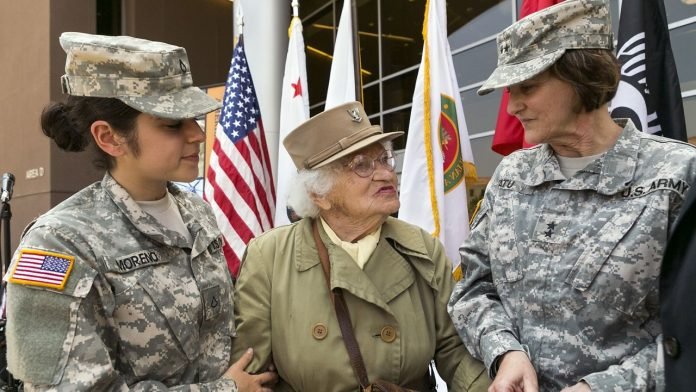Women veterans make up the fastest-growing population to serve in the military and join the Department of Veterans (VA) health care system. In 2021, female veterans comprised 2 million of America’s veterans. The number of veterans is projected to increase to 2.2 million in 2046.
VA continues to adjust to the increasing number of women who are veterans seeking health care.
However, women are still faced with many obstacles when seeking VA health benefits. This includes not being able to identify as an active veteran or being recognized as an eligible veteran when questioned by VA employees, a lack of knowledge and awareness of VA health benefits, and the perception of VA having an “all-male” health care system. Other obstacles include female veterans more likely to be affected by mental health issues, as well as military sexual trauma and chronic treatment and management of pain for muscle and joint disorders.
The American Legion has emphasized that the term “veteran” means “veteran”, and that all veterans should receive equality in treatment, no matter what gender. Some of the most notable aspects of legislation for 2021 which improves the conditions of women veterans:
Protecting Mothers Who Serve Act
The Protecting Moms Who Served Act is an American Legion-backed piece that enhances the health of mothers who are veterans. It was backed by U.S. Senators. Tammy Duckworth, D-Ill., Susan Collins, R-Maine and U.S. Rep. Lauren Underwood of Illinois. The legislation passed Congress. The bill passed the Senate through unanimous consent, as well as in the House of Representatives by a vote of 414 against 9.
The bill requires the government to invest $15 million in VA to improve the quality of maternity care provided to women veterans. The law also commissions the first comprehensive report ever on maternal morbidity and mortality in postpartum and pregnant veteran women, with a particular focus on the racial and ethnic differences in maternal health outcomes among veterans.
The American Legion seeks continued improvements in the VA’s reproductive services and to ensure that the requirements female veterans have are fulfilled through a wide range of health services. The closing of the gaps in the areas like maternity, newborn and reproductive care will ensure women seeking medical services through VA are satisfied that it’s designed to meet their needs.
Deborah Sampson Act
The Deborah Sampson Act is a feature of the Johnny Isakson and David P. Roe, M.D. Veterans Health Care and Benefits Improvements Act of 2020, was adopted into law on Jan. 5.
The legislation opened the way for better treatment of women veterans in the Veterans Health Administration (VHA). The law created the Office of Women’s Health within VHA to supervise programs for women’s health. It is responsible for ensuring that the highest standards of treatment that women vets receive are fulfilled through the VHA. In addition, the law requires that each VA health care facility have a women’s health primary care provider.
“The American Legion wants every female veteran who enters the doors of the VA healthcare facility to be able to sense it was created with women in mind and is no longer the appearance of a ‘For Male’ only facility,” The American Legion declared in the spring of 2021 in testimony to Congress. “Passage of the Deborah Sampson Act of 2020 was a significant improvement in facilitating the introduction of modifications to the previous male-oriented system of VA health care. We anticipate it to serve as an inspiration in the progress toward equality in the treatment of women vets.”
Even though both Protecting Moms who served Act and the Deborah Sampson Act have been enacted into law, there’s more work to be accomplished. Although VA has made major progress in women’s health care across the VA health system, there is the need for improvement to ensure VA has models of care with standards and models that are gender-specific and culturally appropriate.
In the recently-held testimony in a joint meeting of both the Senate and House Committees on Veterans Affairs, American Legion National Commander Paul E. Dillard highlighted four points in his writing testimony Congress must consider:
* Increasing access to mammography for women who are veterans.
* Expanding access to child-care services and newborn care in VA hospitals.
* Supporting studies of inpatient women-veteran-specific alcohol and drug dependency and betting rehabilitation programs.
- Monitoring the timely implementation of legislation that was signed into law that affects women veterans.
“Women have served as volunteers in every conflict since the American Revolution,” stated the testimony. “They have stood shoulder to shoulder with their male counterparts and have played crucial roles to ensure our country’s defense.”
VA should continue to plan in advance for these changes in demographics and ensure women veterans receive top-quality services and the resources they’ve acquired.
ATTENTION READERS
We See The World From All Sides and Want YOU To Be Fully InformedIn fact, intentional disinformation is a disgraceful scourge in media today. So to assuage any possible errant incorrect information posted herein, we strongly encourage you to seek corroboration from other non-VT sources before forming an educated opinion.
About VT - Policies & Disclosures - Comment Policy




